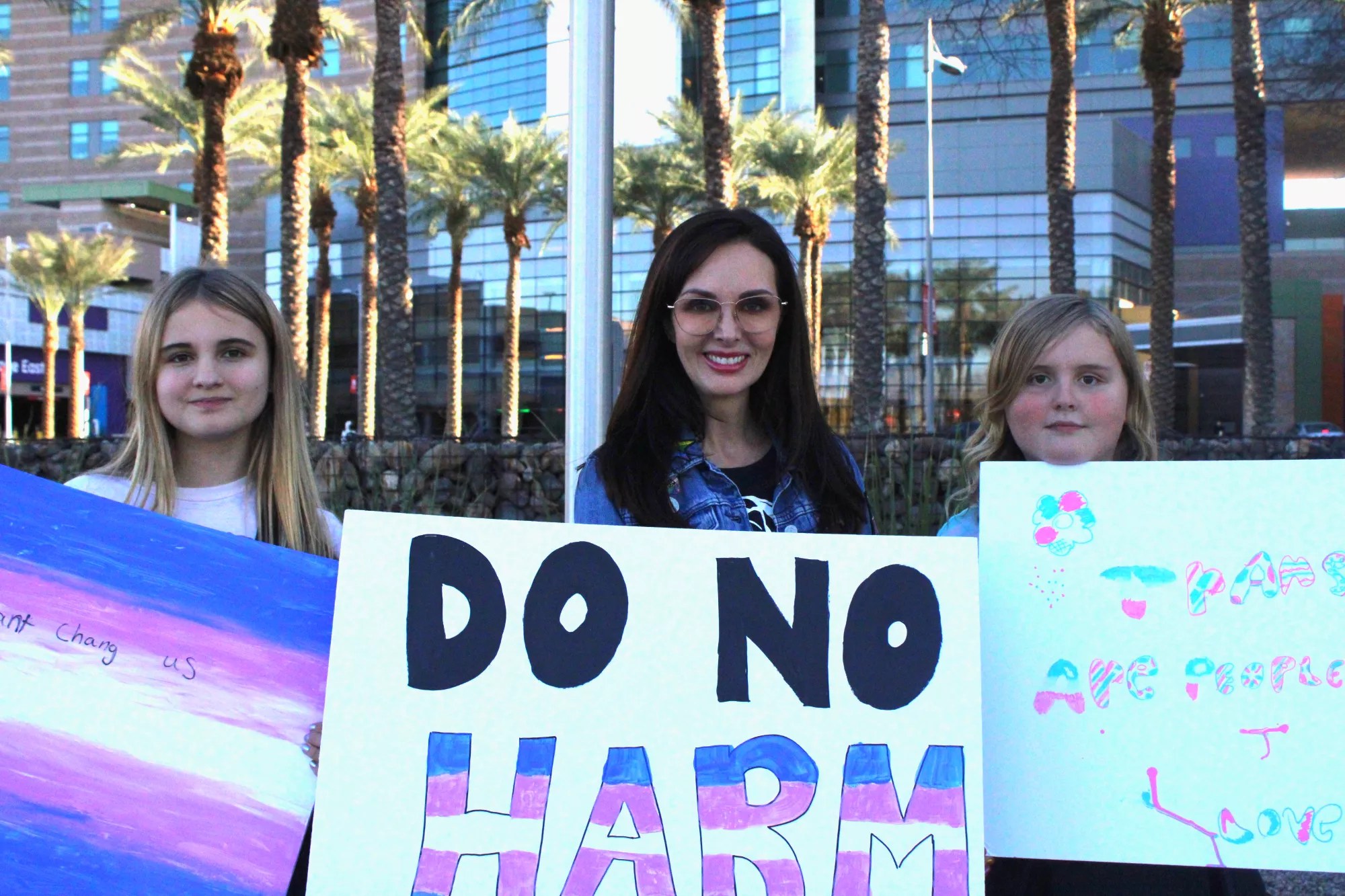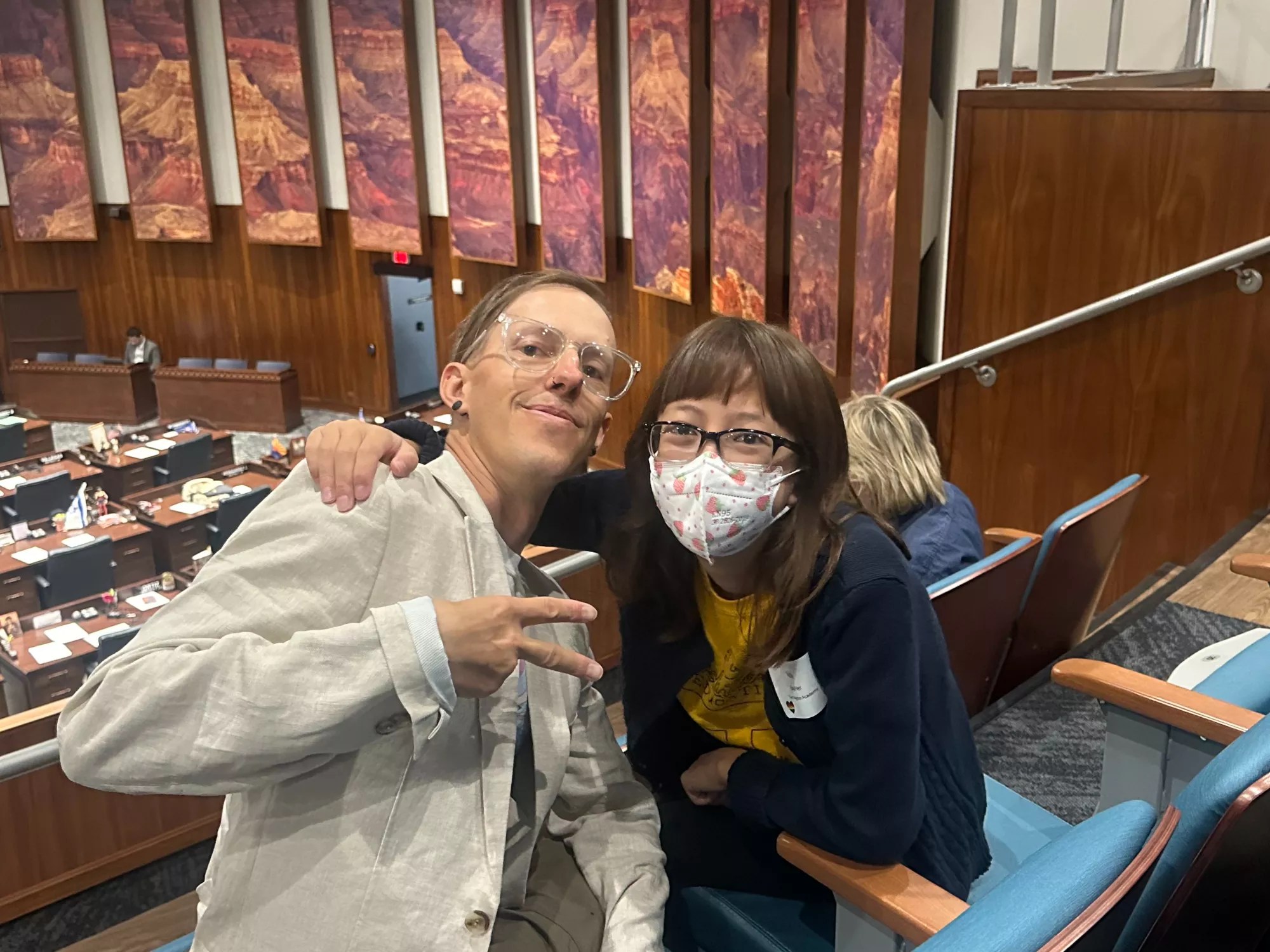
Illustration by Eric Torres

Audio By Carbonatix
With orange Cheeto dust coating the tips of her fingers, 10-year-old Dempsey Button twirled her skirt and skipped around the courtyard of Phoenix Children’s Hospital on a recent February afternoon. Unable (or perhaps unwilling) to find a trash can, she gleefully handed an empty chip bag to the person who cleans up everything: Melissa Button, her mom.
Mothers and daughters everywhere have that same interaction on a near-daily basis – Here, YOU throw this away – but the routine exchange between the two Button women was all the more resonant for what was happening around it. As Dempsey frolicked and munched, dozens of people waved signs and chanted slogans in front of the hospital, protesting for her right to exist.
Dempsey is transgender and has identified as a girl since she was old enough to make decisions for herself. (One of her first: rejecting her blue-colored room and Star Wars sheets.) As she neared puberty, though, another decision loomed. Soon, Dempsey’s physical development would begin diverging from her identity. That’s why, nine months ago, the Buttons had an appointment with doctors at Phoenix Children’s Hospital to discuss starting their daughter on gender-affirming care.
PCH is the largest provider of gender-affirming care to transgender youth in the Valley – or was until recently. On Jan. 28, President Donald Trump signed an executive order yanking funding from any entity aiding in “the so-called ‘transition’ of a child from one sex to another.” The order, which amounts to a direct attack on trans kids, applied to anyone seeking care who is under 19 years old.
Not long after, PCH informed parents that the hospital would be “indefinitely pausing all gender-affirming medical care for children under the age of 19.” Another provider, Prisma Community Care, did the same. Prisma resumed offering gender-affirming care after a federal judge temporarily blocked Trump’s order, though it is not accepting new patients.
PHC hasn’t resumed anything, nor has it explained why. In a statement provided last week, the hospital said: “Phoenix Children’s is bound by all federal laws and regulations for the provision of care to its patients. For this reason, Phoenix Children’s is indefinitely pausing hormone therapy services within the Gender Clinic to ensure we are in full compliance with the recent executive order.” The statement did not address the fact that Trump’s executive order had been temporarily blocked.
On Tuesday, that judge extended the block, granting a preliminary injunction against the Trump administration and ordering no funding to be withheld from institutions that provide gender-affirming care. Phoenix New Times tried multiple times to reach PCH to ask if the injunction would prompt it to resume care, but a representative for the hospital did not respond.
The ongoing denial of care is what brought the Buttons and many other families with trans children to PCH’s doorstep on Feb. 18. In a protest organized by Trans Queer Pueblo, roughly 50 people waved signs and filled the air with chants. Melissa wore a “Momma bear” shirt with a rainbow in the middle, while Dempsey’s tie-dye top featured the familiar trans advocacy colors of blue, pink and white. Dempsey’s older sister and younger brother held handmade posters with painted trans flags. “You can’t change us,” the banners read. Cars drove by, honking in support.
Together, they demanded that PCH resume offering gender-affirming care, something that the hospital currently faces no legal barriers to providing. Neither the hospital nor CEO Bob Myers has explained why the hospital has halted that care despite a court blocking Trump’s order, though it’s worth noting that PCH received roughly $4.5 million in federal grants last year. If the hospital doesn’t resume offering gender-affirming care, or if Trump’s order is eventually allowed to go back into effect, the consequences for trans children will be real.
Without that care – which does not include sex reassignment surgery, contrary to many Republican-pushed myths – their appearances will gradually match their gender identities less and less. Kids like Dempsey, who has lived essentially her whole life as a girl, will develop male features. Without treatment, trans boys will develop as girls. The physical changes likely will cause severe emotional stresses, often worsened by the teasing of cisgender peers and leading to suicidal thoughts.
“We are scared,” Melissa Button said. “There’s a lot of really heavy ramifications for us.”
For the Buttons, that crisis is on the horizon. Dempsey is not yet at puberty, and her family has not yet decided on pursuing gender-affirming care. “We wanted to be able to meet with doctors and figure out what would be appropriate for her,” Melissa said. But now that option “has been taken from us.”
For Dempsey and so many other trans children in Arizona, the ticking clock gets louder and louder.

Melissa Button and her two daughters, Bailey (left) and Dempsey (right), pose in front of Phoenix Children’s Hospital on Feb. 18.
Morgan Fischer
What is gender-affirming care?
To understand the current plight of trans kids in Arizona, it’s important to know exactly what gender-affirming care is. And, just as importantly, what it isn’t.
In Arizona, gender-affirming care for minors was provided primarily by PCH and Prisma. That care includes mental health support and general physician care, as well as puberty blocker shots and hormone replacement therapy. Trans boys may receive testosterone shots to promote the development of stereotypically male features. Trans girls may receive estradiol pills to promote the opposite.
But gender-affirming care is not permanent, at least when it comes to minors. (In fact, its very reversibility is partly why Trump’s order threatens to cause so much damage to trans kids already in treatment.) Stop taking the puberty blockers and puberty reasserts itself. Cease the hormones and the body’s natural hormones will take over.
Surgery, which is sought by many trans adults, is a much more permanent way to align one’s appearance and identity, but minors are barred from receiving it under a pair of 2022 laws signed by former Gov. Doug Ducey. Even before that ban, the number of minors undergoing gender-reassignment surgery represented a “tiny, tiny proportion of patients,” said Ari Kravitz, a nurse practitioner at Spectrum Medical, a Phoenix internal medicine clinic that provides gender-affirming care to adults.
Far-right conspiracy theories warn of surgery being foisted upon children in a “very cavalier way without really considering the overall health and ongoing health of the child,” said Prisma CEO Jessyca Leach. But the reality is the opposite. Just as in any family, parents of trans kids deliberate carefully about any medical decisions regarding their children. The process of receiving gender-affirming care is rigorous, Leach said, and providers are “very, very thoughtful in working with parents and youth kiddos to make sure that the care we offer is suitable and is right for them wherever they’re at in their life.”
Jezz Putnam knows this firsthand. Putnam, who is nonbinary and uses they/them pronouns, is a board member of Arizona Trans Youth & Parent Organization. For the last four years, Putnam has worked to get gender-affirming care for their daughter, Nabi.
Now 13, Nabi began experimenting with gender at 3 years old. She was always drawn to more feminine things such as the color pink. When she reached 10 and approached puberty, Putnam and their co-parenting partner explored their care options.
That began with counseling. After at least six months of mental health treatment, a psychiatrist diagnosed Nabi with gender dysphoria, which the American Psychiatric Association defines as a psychological distress that often begins in childhood for some people whose sex assigned at birth doesn’t match their gender identity.
Nabi began puberty blockers. The injections will delay puberty until a patient is old enough to start making medical decisions for themselves and “does not cause any permanent physical changes,” Kravitz said. If a patient stops taking blockers, the puberty process “starts right back up.”
They are not handed out like candy. It took two years for Nabi to receive approval for her blockers. Even then, it took months before she could even start receiving injections. Putnam spent hours on the phone with PCH and the insurance and drug companies in what they called “a big medical quagmire of processes you get stuck in.” Their insurance company kept denying the medication and before shipping them, the drug company wanted the money. Out-of-pocket puberty blockers can cost as much as $10,000 a year.
“You can’t go somewhere, walk in, get a letter, come out and get a blocker the next day. That’s not how it works,” Putnam said. “They want to get to meet the family. They’re going to really spend time with your child. It’s murky (and) if you’re not persistent, you may not get it.”
In the spring of 2024, after months of waiting, Nabi started receiving her puberty blocker shots, which are administered every three to six months. For a trans girl, the next step in their gender-affirming journey is hormone replacement therapy with estradiol, which is offered in the form of pills, a patch or an injection. Nabi started estradiol in December. She calls the drug “FemThron3000.”
It’s an apt name. Estradiol, an estrogen steroid hormone, is often paired with androgen blockers to specifically block testosterone. Using it leads to breast development, skin softening and improvement of mood in trans girls. Trans boys receive testosterone, most often by injection, which results in a deeper voice and the development of facial and body hair.
Think of it as guiding puberty in the right direction. Without that treatment, trans kids barrel the wrong way down the hormonal highway. They become unwilling passengers in their own bodies, the mental effects of which are scary for them and their parents.
“It’s heartbreaking to hear your kid sob herself to sleep at night because her insides don’t match her outsides,” Melissa Button said of her daughter. “The thing she fears most is growing into a man.”

Jezz Putnam and their 13-year-old daughter, Nabi, pose in the gallery of the Arizona House of Representatives.
Courtesy of Jezz Putnam
What comes next?
Hormone replacement therapy can be a literal lifesaver for trans kids.
Trans kids are four times more likely to commit suicide than their cis counterparts, according to a National Institute of Health study. A study published by the medical journal Cureus showed that more than 73% of trans participants reported a history of suicidal ideation. Yet for those who had received gender-affirming care, that percentage dropped to 43%.
When access is cut off, by Trump or by providers like PCH who are cowed into not offering it, a corresponding spike in depression and suicide rates among trans youth is sadly to be expected.
“Stopping care is going to kill people,” Kravitz said. “I truly believe that it’s going to kill kids.”
Here’s what happens to a trans kid forced to stop puberty blockers or hormone replacement therapy. A trans girl forced to stop blockers would go through male puberty – her voice would deepen, her body and facial structure would undergo changes and she’d develop body hair. Trans boys would begin to develop breasts and would menstruate, which Kravitz said are “two of the most distressing things to trans guys.” Their vocal deepening and facial hair development would also stop.
PCH said it would work with pharmacists to wean children off puberty blockers or hormones if they are currently taking them, according to the publication LOOKOUT. But these physical changes can be “very distressing” for trans youth, Kravitz said. What’s more worrisome, Leach said, is the negative mental health effects that come with ending gender-affirming care.
What happens in gym class to the trans girl – who has identified as a girl since preschool – who gradually starts to present as male? What barbs and bullying can she expect from her fellow teenagers? What about the trans boy who is forced to start wearing a bra or uncomfortable binders to flatten his chest? Will the notoriously cutthroat halls of middle and high school offer him kindness and understanding?
Trans youth are already in the midst of a mental health crisis. The Trevor Project, a suicide prevention and crisis intervention organization for LGBTQ+ youth, saw a 46% increase in demand for its crisis services after Trump’s inauguration. After Trump’s win in November, the volume of crisis lines increased by 700%.
On the day after Trump was elected, Nabi stayed home from school depressed. Another parent – Tempe resident Karen, whose last name New Times is withholding to protect her child’s identity – said her 14-year-old trans son cried when he heard the news.
Even before the election, some parents with trans kids started to speed up care. At the direction of PCH providers, Nabi’s final counseling session before she could start receiving hormone replacement therapy was moved up to Nov. 5 – Election Day. Karen said her 14-year-old trans son successfully sought to speed his testosterone regimen to ensure he received treatment before Trump took office.
Trump’s broadside against gender-affirming care now leaves trans kids and parents scrambling to figure out what to do. Even after Nabi started taking estradiol pills, Putnam frantically researched alternative clinics leading up to Trump’s inauguration. Many families whose children received gender-affirming care at PCH are counting their remaining pills, praying their next prescription goes through and researching backup providers.
Nabi still has an estrogen prescription, which Putnam hopes remains valid. But her final puberty blocker, which was supposed to act as a bridge between puberty suppression and hormone replacement therapy, is being interrupted. Since COVID-19, Nabi hasn’t stopped wearing a mask every day to hide any male features that burst through.
Putnam said attendance at Arizona Trans Youth & Parent Organization meetings has skyrocketed since Trump issued his executive order, and the atmosphere is fraught. These are not “happy meetings,” Putnam said. “People are freaking out.” So is Melissa Button, who isn’t sure where to turn for Dempsey. With the largest provider of gender-affirming care out of the game, Melissa feels a “tremendous amount of fear.”
To protect her son’s mental health, Karen still hasn’t told her son that PCH has stopped providing gender-affirming care. Since taking testosterone prescribed by PCH, her son has developed a little mustache and a deeper voice, changes she hopes will last. He’s stocked with testosterone to be “good for quite a while,” but Karen worries he’ll be unable to continue getting the medication to suppress his period.
Just getting to this point was not easy, Karen said. “My husband had a harder time than I did. It took him a good several weeks to get himself together,” she said. “He went through what some parents go through when the kid comes out as trans, kind of a grieving period for his little girl.” But now they are united in doing whatever they can to help their son.
If that help isn’t available in Arizona, Karen said her family may have to trek to and from California for his care. They’ve even considered leaving the country, relocating to some other nation whose leaders haven’t decided to persecute transgender people for cheap political points.
In Arizona, Karen and others worry – and increasingly in the U.S. as a whole – their children are not allowed.